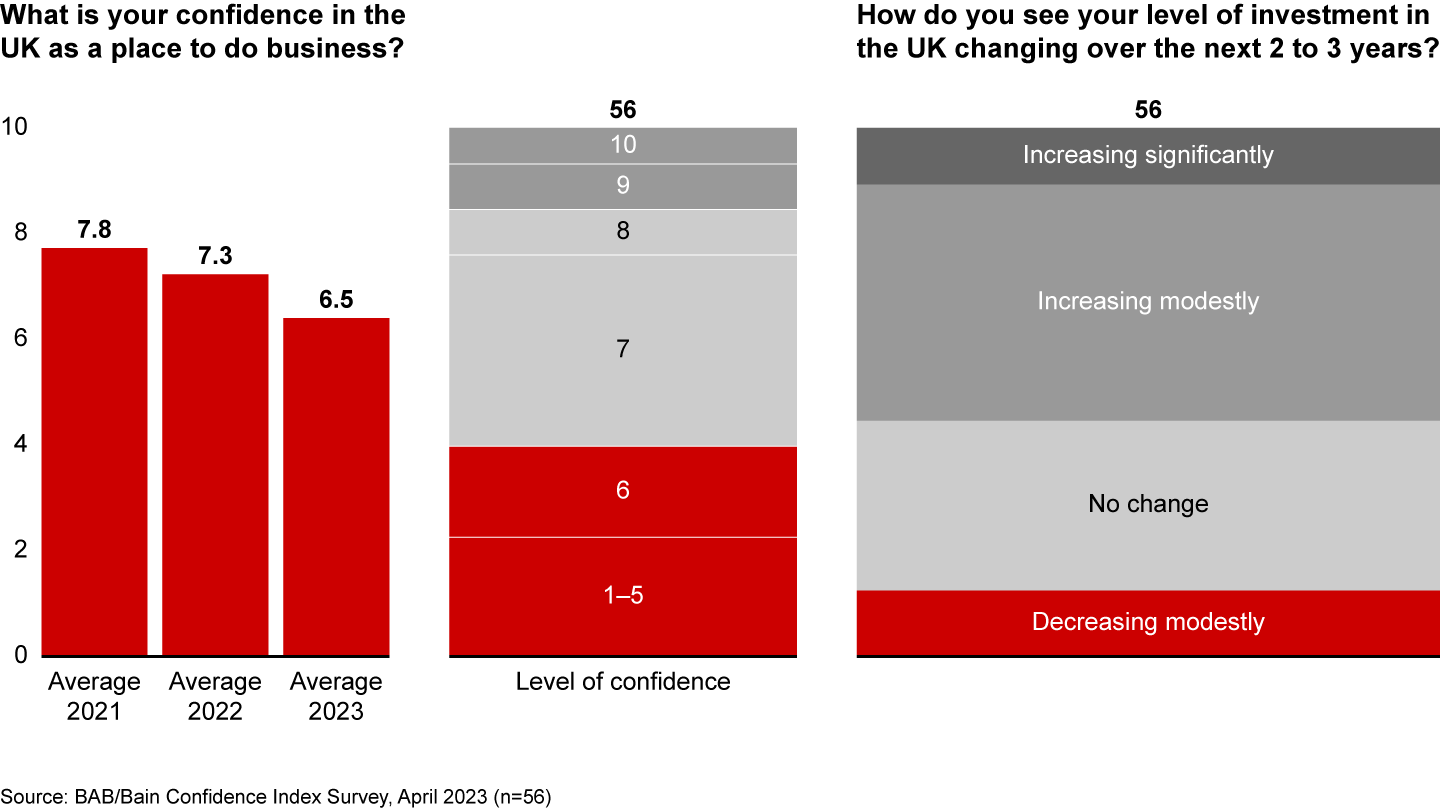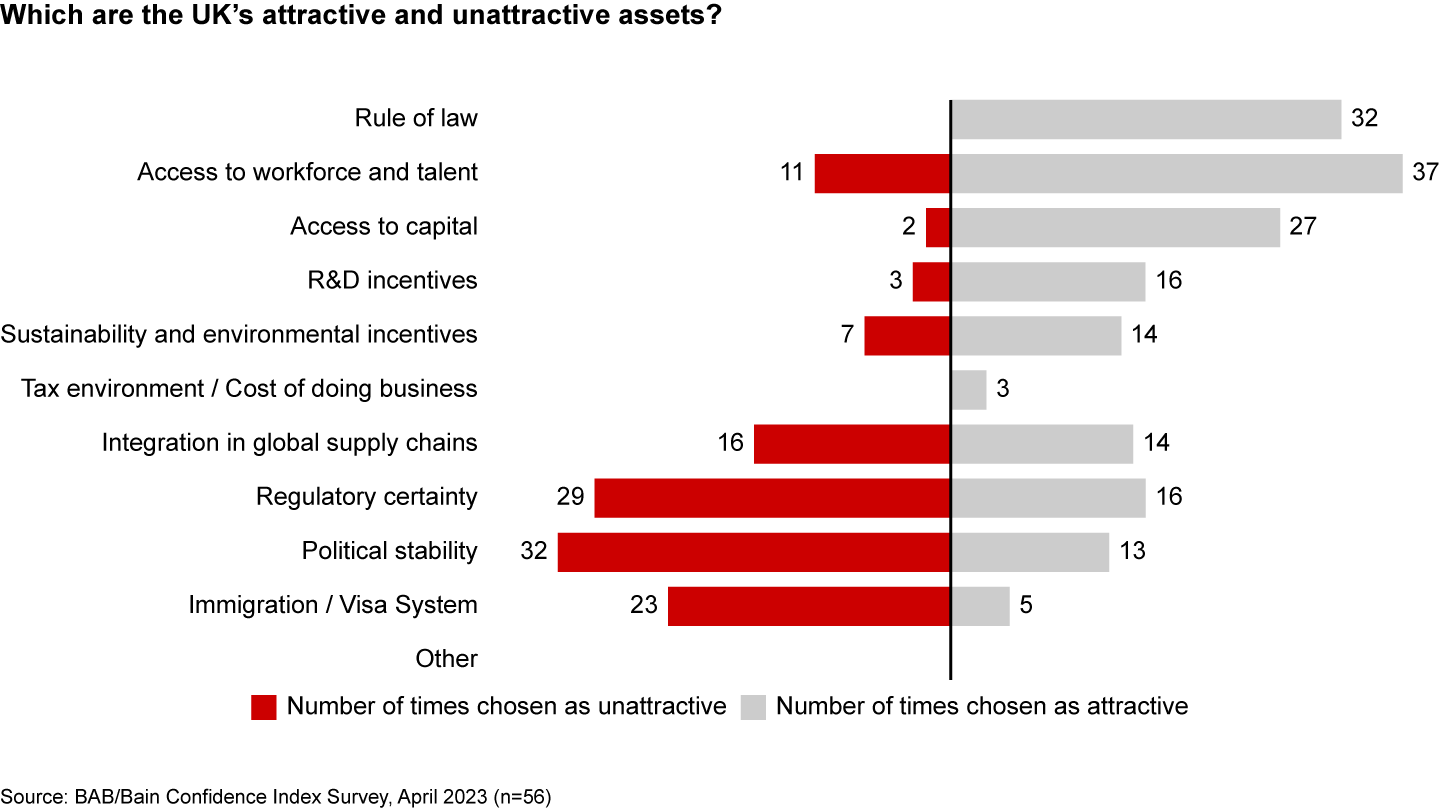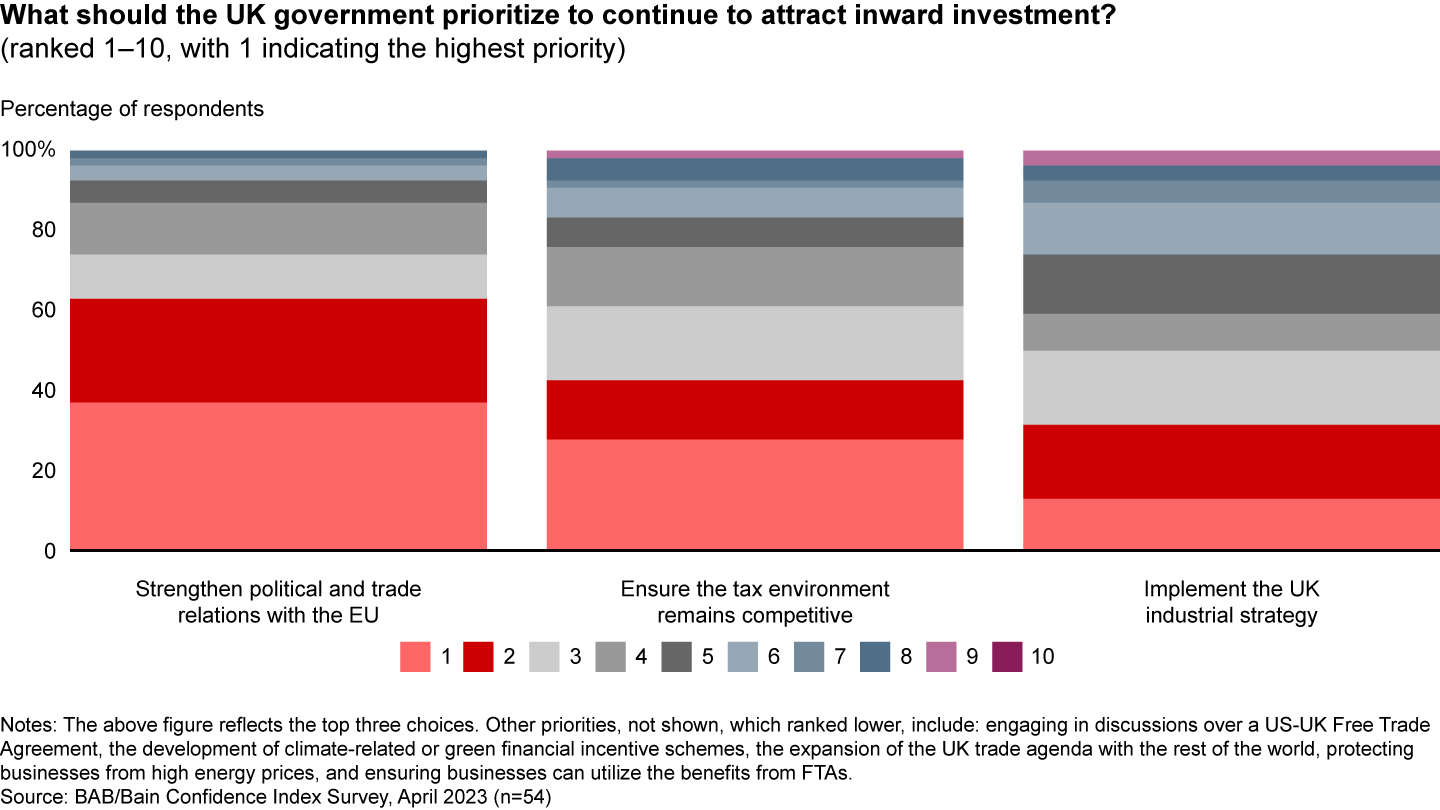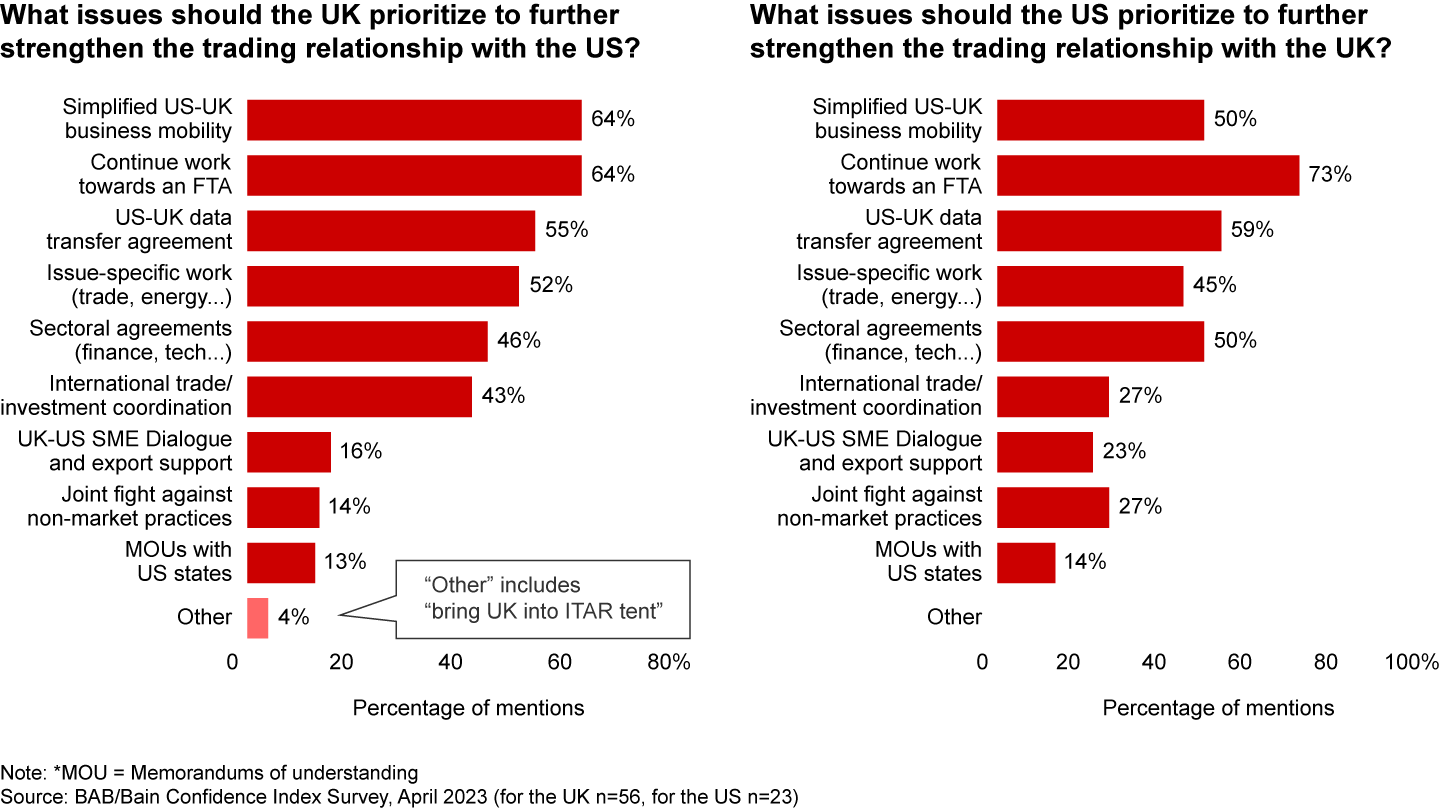
At a Glance
- Confidence in the transatlantic corridor is stable, with investors reporting only marginal change.
- US companies’ confidence in the UK dropped for the third consecutive year, while UK investors’ confidence in the US was steady and high.
- The UK’s departure from the EU and questions about its future economic growth dominate US business thinking. UK companies’ view of the US is predominantly positive.
- Companies’ priorities for both governments are nearly identical, and the call for transatlantic economic collaboration is stronger than ever.
We published the first Transatlantic Confidence Index in the immediate aftermath of the UK’s departure from the EU. The years since have been turbulent, this past year included. Macroeconomic and geopolitical challenges continued, including high inflation, the ongoing possibility of recession, the Ukraine war, and increasing political and economic tensions with China. In addition, the transatlantic corridor saw multiple changes of leadership in the UK government and major economic legislation in the US, both of which affect business thinking and action.
Written in collaboration with
Written in collaboration with

Despite all this, the economic relationship between the US and the UK continues to be a crucial pillar for both countries. According to the Transatlantic Economy 2023 report, the US and the UK remain significant economic partners, reporting solid levels of trade, investment, and jobs created by the economic relationship between both nations.
To inform this year’s confidence index, in April 2023, BritishAmerican Business and Bain & Company surveyed 79 large or growing companies that do business in the corridor. Fifty-six of the companies were US-based entities operating in the UK, and 23 were UK companies that are active in the US. These companies represent 325,000 employees and operate in every region of the UK and in most US states.
The survey reveals how confident companies are about the US-UK relationship and future investments. It identifies key priorities, as well as each country’s most attractive and unattractive qualities. Because we conduct this survey annually, the report also compares current sentiments against those from previous years.
In 2023, respondents said the transatlantic corridor’s health was relatively stable. It earned an average confidence rating of 7.0 out of 10—almost the same rating it received in 2022. UK companies’ confidence in the US was increased slightly since last year. However, US companies’ confidence in the UK dipped significantly. This report explores potential reasons for the decline.
Companies on both sides report a continued, unwavering desire for increased economic collaboration between the US and the UK. And companies from both sides are aligned on business priorities—to the greatest extent we’ve measured since the index began. In this survey, companies present a clear and united message about opportunities for the US and UK governments.
What US companies say about doing business in the UK
For the third consecutive year, US investors’ confidence about investing in the UK dropped—and to a greater degree than it fell between 2021 and 2022. On a scale of 1 to 10, the average confidence rating was 6.5 in 2023, almost a full point lower than in 2022 (see Figure 1).

US companies noted the UK’s historic strengths, including talent and the rule of law (see Figure 2). Despite the drop in overall confidence, more than half of respondents said they believe they will continue or increase their investments in the UK.

Three years after the UK’s departure from the EU, US companies have persistent concerns about repercussions from the departure. In fact, the political and trade relationship between the UK and the EU was the number-one priority that US companies want the UK government to address to attract investments (see Figure 3). Nearly 40% of US respondents said it was the top priority; nearly 75% of US respondents placed it in their top three.

It is notable that our survey was conducted after the signing of the Windsor Framework in March 2023. Respondents acknowledged improvements in the UK-EU relationship over the past three years, with confidence in the future of the relationship creeping up from 5.1 in 2021 to 5.6 this year. The pace of improvement, however, does not seem to satisfy US companies. In addition to following through on the implementation of the Windsor Framework, US companies are keen to see the UK prioritize, among others, enhanced labor mobility and short-term mobility visas for service providers, mutual recognition of professional qualification, and extending cooperation outside the UK-EU Trade and Cooperation Agreement to areas such as digital policy in its relationship with the EU.
This year, concerns about the UK-EU split were compounded by apprehension over the UK’s political stability and its potential for economic growth and productivity. Last year, respondents’ views on the UK’s political stability were evenly split between positive and negative. Now, they’ve skewed more than two-to-one negative, making political risk a new significant issue.
The attractiveness of the UK’s regulatory certainty also dropped, albeit less dramatically, over the past year. When asked about the UK’s ability to increase economic growth and productivity, the average confidence rating was 5.8 out of 10—despite Prime Minister Rishi Sunak’s efforts to restore stability and substantial policy success, such as the UK’s accession to the Comprehensive and Progressive Agreement for Trans-Pacific Partnership (CPTPP) agreement in March 2023.
Tax was another increasing concern this year. Ensuring the UK tax environment remains competitive was the second priority for US companies. More than 60% of US companies named it as a top-three issue. More than half of respondents said the increase in the UK corporate tax rate from 19% to 25% would affect their confidence in the UK as a place to do business.
There are many bright spots in US investors’ view of the UK. US companies appreciate the progress the UK has made in its relationship with the EU and on domestic economic policy. But the large drop in overall confidence is a clear call for action.
What UK companies say about doing business in the US
This is the second year we asked UK companies about their confidence in the US. In 2023, confidence was stable and high, with an average rating of 8.4 out of 10. Nearly 70% of UK respondents said they believe they will increase their investment in the US in the next two to three years.
New incentives for investment in the US such as the Inflation Reduction Act (IRA) received mixed reviews from UK companies, depending on industry sector and the companies’ abilities to benefit from the incentives. These may have created a halo around confidence in the US market, but the core drivers of confidence in the US are unchanged.
The US is attractive to UK companies for the same reasons reported last year: market size, access to capital, and its workforce. The US accounts for about a quarter of global GDP and has grown faster than other industrialized economies in recent years. The US is also perceived to be a more attractive hub for innovation than the UK.
UK respondents’ views on political stability in the US suggest an increased focus on political risk. Regulatory certainty in the US was also viewed less favorably this year. As in past indices, UK companies cited concerns about labor mobility into the US and about the US-China relationship. These concerns did not, however, affect overall confidence in the US as a place to do business.
While US companies have clear and narrow priorities for the UK government, UK companies have a wide and varied set of priorities for the US government. Five different topics were ranked as the number-one or number-two priority by roughly one-third of respondents. Those included a future US-UK free trade agreement, the full and timely implementation of the Inflation Reduction Act and other incentive programs, constructive bipartisanship in Congress, a competitive tax environment, and the relaunch of a global US trade agenda.
A call for closer economic collaboration
While our survey revealed divergence in confidence among companies in the UK and the US, it also found strong alignment. Both sides say they desire increased economic collaboration between the US and the UK, and they agree on actions each government should take to strengthen the trading relationship.
Companies from the US and the UK prioritized the top issues nearly identically (see Figure 4). Sixty percent of all respondents want to see improvements in business mobility, 55% want a data transfer agreement between the US and the UK to be concluded, and almost 50% of companies want the US and the UK to engage in sector and/or topic-specific work.

The high level of interest in a comprehensive free-trade agreement (FTA) between the US and the UK was somewhat surprising. More than two-thirds of respondents overall said it was a priority. Among UK companies, 73% said a US-UK FTA should be a priority.
The political climate in the US is not currently favorable for large trade agreements. However, companies continue to express the desire for an FTA—and that shows how strongly companies want to see US-UK economic collaboration taken to a higher level, in whatever form it is possible.
Economic interconnections between trusted partners are becoming more important. As the UK re-establishes its global role and designs a path for growth beyond the EU, transatlantic collaboration could be a powerful engine. A strong agenda from both governments could drive growth and increase business confidence across the Atlantic.

About BritishAmerican Business
BritishAmerican Business is the leading transatlantic trade association incorporating the British-American Chamber of Commerce in the US and the American Chamber of Commerce in the UK. We are committed to strengthening the economic corridor between the United States and the United Kingdom by supporting policies and actions that protect and enhance the environment for transatlantic trade and investment on behalf of our members. We convene and serve a growing network of companies and business leaders through networking opportunities, bespoke programming and marketing platforms. We actively promote trade and investment and support those who make the transatlantic corridor part of their business growth ambition. For more information, visit www.babinc.org.



